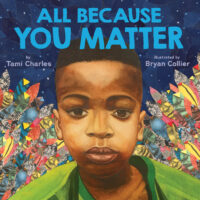It’s been a rough year for everyone, especially children. In March, the coronavirus pandemic spontaneously closed schools across the United States, giving children limited access to their teachers, friends, and daily life as they knew it. Suddenly, schools transitioned to a virtual learning experience filled with Zoom meetings, parent-lead instruction, or sadly, in some cases, the lack thereof.
Check out this guide to using Tami Charles's book All Because You Matter at home and in the classroom.
The pandemic revealed challenges in American society across many sectors: employment, housing, health care, and law enforcement. The highly publicized cases of Breonna Taylor and George Floyd underscored generations of inequities rooted in racism. In turn, this has produced a reckoning of sorts, met with both peaceful protests and civil unrest across the globe.
This, all under the watchful and curious eyes of children.
As we approach the 2020-2021 school year, it is unclear how our nation will proceed in opening schools. Will classes be in-person, under strict social distance guidelines? Will we continue virtual learning indefinitely? Or perhaps a hybrid of both options?
No matter how schools will be conducted in the fall, students will certainly have questions about the issues that continue to plague our country. As teachers, we know the weight of our words when it comes to our students. How can we best help our students navigate these tough talks?
I reached out to a few trusted colleagues to gain their perspective:
“I think most educators will be proactive because we realize that kids have been exposed to many challenging topics recently. A book I plan to read aloud is Ron’s Big Mission. It handles the ideas of institutional racism and protest in a way kids can easily understand. It’s a great segue for us to discuss representation in the library collection.”
Julie Testa, Librarian, Vineland, NJ Public Schools
“As an early childhood educator, I will continue to create a safe space where all topics can be discussed with a focus on respect, reflection, and new learning.”
Jennifer Rinaldi, Kindergarten teacher, Stamford, CT Public Schools
“Without offering my personal opinion, I will make it a teachable moment, using books and resources to have students develop their own argument as it relates to hot topics around COVID19. I want my students to feel that they have an opinion and a voice, yet I’ll try to communicate those ideas in thoughtful, respectful ways.”
April Page-Coggins, 7th Grade ELA teacher, The School District of Palm Beach County, FL
As a former educator who spent fourteen years in the classroom, I wholeheartedly agree with my colleagues. Children will need something to make sense of all of this. And what better way to initiate tough conversations than with books? My recommendations below amplify a wide range of stories that spark healthy dialogue, joy, and a call to action.















